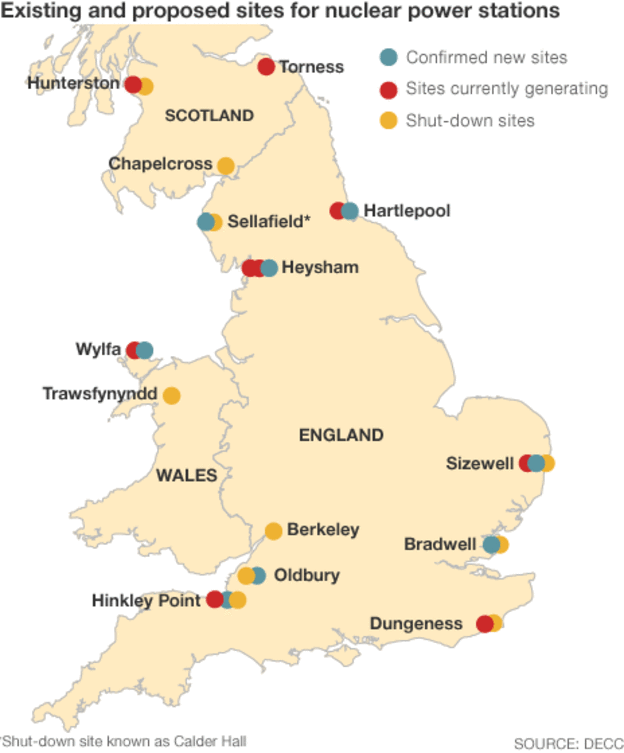Why do we use nuclear power?
As we discussed on our Energy Mix page, power generation technologies should ideally meet the following requirements:
- Reliably produce lots of energy – to let us live life as we want to.
- Not release greenhouse gases – to stop contributing to climate change.
- Be low pollution – to prevent health problems.
Nuclear power technology is the only technology that ticks all of these boxes. Renewable energy sources are fantastic, and should be developed, but at present they cannot be relied upon to produce lots of electricity at all times.
Low-Carbon - The process of nuclear fission produces no greenhouse gas emissions. Nuclear plants also don't produce emissions which are hazardous to health, unlike burning fossil fuels.
Dependable - The UK nuclear industry has supplied over 10% of the electricity used every day for over 4 decades. It does not depend on the weather and is extremely predictable. Nuclear power provides the UK baseload power.
Safe - Nuclear power is one of the safest forms of energy production (it has the lowest associated number of deaths per TWh generated!). The UK is globally recognised as one of the leaders in nuclear safety.
Security of Supply - Nuclear power is less vulnerable to market fluctuations than fossil fuels as its fuel supplies are spread around the world and it requires less fuel.
Secure Jobs - the nuclear industry is a long term business. It really can offer a job for life!
All forms of energy generation have advantages and disadvantages.
Some of the key advantages of nuclear are:
Image: PopAtomic Studios
The main disadvantages of nuclear are:
Disposal of nuclear waste - a small amount of highly radioactive waste is produced from nuclear power generation. However, we can control this relatively easily. We think that is far better than pumping our waste into the atmosphere, like fossil fuel power does with its emissions!
High initial investment costs - building a conventional nuclear power station is expensive, although it has much lower fuel costs than fossil fuels once it is built.
Decommissioning challenges - decommissioning a nuclear power station is challenging due to the radioactivity of some areas. This offers some very interesting work for its employees though!
Nuclear proliferation (the spread of nuclear weapons, fissionable material, and weapons-applicable nuclear technology and information) - the nuclear industry must be careful that it does not contribute to the development of nuclear weapons. This is carefully controlled by the International Atomic Energy Agency, through safeguards.
A lot of work is done to reduce the potential risks of nuclear enegy, making it a very safe industry to work in. Safety cases (a body of evidence to show that a design is safe), waste and decommissioning plans, and non-proliferation practices are used.
Nuclear power is low carbon, affordable, dependable, safe and capable of increasing the diversity of energy supply.
More information about nuclear power can be found through the useful links page.
Nuclear power stations in the UK.
Nuclear power generation has been part of the UK’s energy mix since 1956. Currently in the UK there are 10 operating nuclear power stations. The locations of which are shown on the map below:

Nuclear power stations have a lifespan (depending on design) of around 40 to 60 years. Some of the power stations in the UK are reaching the end of their operational life and will have to be shut down in the near future. The entire UK nuclear fleet (aside from Sizewell B which was built later) is scheduled to be shut down by 2024.
This will leave what is known as an “energy gap” in the UK. This is where the amount of electricity we want to use is more than the amount of electricity that we can generate. We clearly will need to build new power plants to provide this energy. As discussed above, nuclear power is a good way to reliably produce lots of energy with minimal effect on the environment.
Three different companies have plans to build new nuclear power stations in the UK. These are EDF Energy, Horizon Nuclear Power and NuGeneration Limited. You can quickly find out a lot of information about these projects by searching on the internet.




